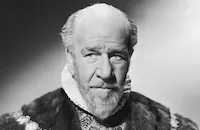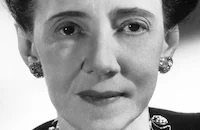A Bill of Divorcement

Brief Synopsis
Cast & Crew
George Cukor
John Barrymore
Billie Burke
David Manners
Katharine Hepburn
Paul Cavanagh
Film Details
Technical Specs

Synopsis
During a Christmas Eve party at her home in England, Sidney Fairfield accepts the proposal of her boyfriend, Kit Humphrey, and fantasizes about having a large family with him. At the same time, her mother Margaret, who has just secured a divorce from her mentally deranged husband Hilary, confirms her upcoming marriage to lawyer Gray Meredith. On Christmas Day, however, Sidney is surprised when Hilary, who has been committed to an insane asylum for the last twenty years, unexpectedly returns home. Agitated by his homecoming, Hilary mistakes Sidney, whom he has never seen, for Margaret, then explains how he suddenly regained his sanity that morning and walked out of the asylum. When Sidney realizes that Hilary has no knowledge of her mother's divorce, she tries to break the news to him but is stymied by his unrelenting, childlike enthusiasm. Margaret, who has gone to church with Gray, comes home and is stunned by Hilary's reappearance. While Margaret awkwardly faces Hilary, Sidney telephones Dr. Alliott, the family physician, and asks him to see her father. Before Dr. Alliott arrives, however, Hilary spies Margaret with Gray and forces her to reveal the truth about the divorce. Outraged by Margaret's seeming betrayal, Hilary denounces her in front of Sidney and Dr. Alliott. Sidney, who has been told by her mother and her aunt Hester that her father lost his mind as a result of World War I "shell shock," then learns about the Fairfields' history of inherited insanity. After Dr. Alliott calms Hilary and convinces him to return briefly to the asylum, Hilary begs Margaret to stay with him and break her engagement to Gray. Although she no longer loves Hilary, Margaret, overwhelmed by guilt, gives in to his wishes. While Hilary goes with Dr. Alliott to the asylum, Sidney confesses to Kit about her father and the family's history of mental illness. In spite of assurances from Kit that he will love her even if they have no children, Sidney insists that they end their romance. Then when Hilary overhears Margaret tell Gray that she has only pity for her sick husband, he frees her from her promise and urges her to leave with Gray. Suddenly alone, Sidney explains to her father that she is in "the same boat" as he, and Hilary understands the sacrifice that she has made. As they grope to find the proper ending to a piano sonata that Hilary had begun composing twenty years before, father and daughter pledge to stay together for the rest of their lives.

Director

George Cukor
Cast

John Barrymore

Billie Burke

David Manners

Katharine Hepburn

Paul Cavanagh

Henry Stephenson
Gale Evers

Elizabeth Patterson

Bramwell Fletcher

Julie Haydon
Crew

Film Details
Technical Specs

Articles
A Bill of Divorcement
Selznick and director George Cukor considered several actresses for the role of Sydney Fairfield, including Norma Shearer and Irene Dunne, but the part went to the then unknown 24-year-old Katharine Hepburn. George Cukor had seen her screen test and was impressed with the young actress. Selznick, however, did not like the way she looked and feared audiences would feel the same way. He was soon surprised by the audience's positive reaction during the film's preview. According to Anne Edwards in A Remarkable Woman: A Biography of Katharine Hepburn, Selznick said, "very early in the picture there was a scene in which Hepburn just walked across the room, stretched her arms, and then lay on the floor before the fireplace. It sounds very simple, but you could almost feel, and you could definitely hear, the excitement in the audience. It was one of the greatest experiences I've ever had. In those few simple feet of film a new star was born."
Critics loved the new actress as much as audiences did. The Hollywood Reporter stated, "After last night, there is a new star on the cinema horizon, and her name is Katharine Hepburn. The dynamic way in which this newcomer swept the audience off its feet at the preview is only a forerunner of the way she will capture followers by the millions. Not many times in the history of celluloid entertainment has there been such a first performance as Miss Hepburn gives." In the New York Post, Thornton Delehanty commented on her "dignity and an instinct for underplaying an emotion. Miss Hepburn has the makings of a star."
Hepburn's nonconformist behavior during the filming of A Bill of Divorcement, however, made studio executives wonder if she ever would become a star. When she wasn't on the set, the young actress would wear overalls and torn tennis shoes. As word started to spread about the promising new actress, reporters came to the studio every day to see Hepburn. But overalls did not go with the image the RKO publicity department had in mind for Hepburn. Studio executives threatened to take her overalls if she kept wearing them. Hepburn refused and the studio followed through with their threat. When they refused to give her clothes back, Hepburn made a threat of her own. If they didn't return her pants, she would walk across the studio lot practically naked. Studio executives knew she might actually do it, but they still refused to give them back. Hepburn then walked across the lot in her underwear. According to Edwards, "Barrymore thought this was uproarious, but the studio did not laugh. They immediately confiscated all pictures taken of Kate in her stroll and, to her delight, gave her back her dungarees."
In spite of her sometimes odd behavior, after the release of A Bill of Divorcement, David O. Selznick quickly signed Hepburn to a new contract. He knew she had a bright future and he wanted to sign her before another studio could.
A Bill of Divorcement was the second of three films based on a play by Clarence Dane. The first was a 1922 silent film. RKO later remade it in 1940 with Adolphe Menjou and Maureen O'Hara.
Producer: David O. Selznick
Director: George Cukor
Screenplay: Howard Estabrook and Harry Wagstaff Gribble. Play by Clemence Dane.
Cinematography: Sidney Hickox
Art Direction: Carroll Clark
Music: Max Steiner
Principal Cast: John Barrymore (Hilary Fairfield), Katharine Hepburn (Sydney Fairfield), Billie Burke (Margaret Fairfield), David Manners (Kit Humphreys), Paul Cavanagh (Gray Meredith).
BW-70m.
By Deborah L. Johnson

A Bill of Divorcement
Quotes
Trivia
The original play opened in London on 14 March 1921.
The premiere in New York on 30 September 1932 was a benefit for the "Free Milk Fund for Babies, Inc.". The price of a ticket was $10.00.
Katharine Hepburn's first film.
Notes
Katherine Cornell, a well-known stage star, played the role of "Sidney" in the 1921 Broadway production of Dane's play. Modern sources state that Clemence Dane's play, reportedly inspired by Henrik Ibsen's play Ghosts, was a favorite of producer David O. Selznick. Although most reviews and the copyright cutting continuity spell Katharine Hepburn's character name as "Sydney," the onscreen end credits give the name as "Sidney." According to advertisements, A Bill of Divorcement was "selected and presented under the auspices of Mrs. William Randolph Hearst for the benefit of the Free Milk Fund for Babies, Inc." Admission to the benefit screening, which occurred in New York on September 30, 1932, was $10.00 per ticket. The Hollywood premiere was a benefit for the Motion Picture Relief Fund, according to Hollywood Reporter. In an inter-office memorandum to various RKO executives, Selznick wrote that A Bill of Divorcement was "one of the best pictures, and possibly the most adult and intelligent picture, ever made." He then admonished his executives that "even if it is correct that the picture is 'too good for our audiences' (and I, personally, don't think there is such a thing), I do not think we should arrive at this conclusion in advance of its presentation to the public."
RKO borrowed David Manners from Warner Bros. for the production. According to a Film Daily news item, Reginald Owen was assigned to play a "straight, romantic role" in the film, but his participation in the final film has not been confirmed. Billie Burke, a veteran stage and silent screen star, made her sound feature film debut in this film. Burke's husband, Florenz Ziegfeld, died during the production. According to RKO records, Burke was paid $1,500 per week for a total of four weeks, while John Barrymore's contract guaranteed him $50,000 and 15% of the film's gross after the first $1,000,000 in profits.
Hepburn (1907-2003) made her screen debut in the film. The Variety reviewer astutely noted that Hepburn "has a vital something that sets her apart from the picture galaxy" and speculated that if she repeated her performance in a similar role in her next picture, she would be "headed for the cinema heights." (In her next film, Christopher Strong, Hepburn played a strong-willed aviatrix. Although the actress again enjoyed critical acclaim, the film did not do well at the box office. Nevertheless, her performance in A Bill of Divorcement earned her star status at RKO.) Several reviewers compared Hepburn to Greta Garbo, stating that while Hepburn lacked Garbo's mystery, she possessed the same striking, powerful presence as the Swedish star. A contemporary article in New York Times gives the following account of Hepburn's casting: Her performance as the "Amazon Queen" in the 1931 Broadway play The Warrior's Husband landed her a screen test with RKO. After executives saw the finished film in the projection room, they signed Hepburn to a contract, which called for her to appear in two films per year, with time off for stage plays. Hepburn was paid $1,500 per week for a total of $7,125. (Modern sources note that a few scenes with Hepburn had to be re-shot after the initial four weeks of production.) Prior to Hepburn's involvement, Irene Dunne and Anita Louise were considered for the role of "Sidney," according to a June 1932 Film Daily news item. Modern sources add that Jill Esmond also was offered the role, but turned it down. Modern sources note that the film's proposed budget of $300,000 prohibited the hiring of Irene Dunne, a prominent RKO star who was earning $15,000 per film at the time.
Modern sources add the following information about Hepburn and the production of this movie: For her screen test, Hepburn chose, not a scene from A Bill of Divorcement, but a scene from the Philip Barry stage play Holiday. The test, directed by RKO talent scout Lillie Messenger, was shot in New York, with Alan Campbell playing opposite Hepburn. Although RKO executives in Los Angeles were less than impressed by the footage, director George Cukor was struck by the way that Hepburn had placed a glass on the floor of the set and voted to cast her. Backed by Selznick, who also felt that Hepburn had a striking, fresh screen presence, Cukor brought Hepburn to Los Angeles. Before shooting began, Cukor arranged for Hepburn's hair to be re-styled and her facial freckles covered with makeup. In preparation for her first film role, Hepburn spent time on the RKO lot, studying each aspect of the filmmaking process. In modern interviews, Hepburn praises Barrymore for teaching her a "tremendous lot" about film acting during this production.
Modern sources add the following crew credits: W. Franke Harling (Piano concerto composer); Josette De Lima (Costumer) and Mel Berns (Makeup artist). Modern sources credit Dennis O'Keefe (then known as Bud Flanagan) as a "Dance extra." A British version of Dane's play, titled A Bill for Divorcement, was filmed in 1922. Denison Clift directed Constance Binney and Fay Compton in that silent version. RKO made a second version of Dane's story in 1940 (see below).

Miscellaneous Notes
Released in United States 1932
Feature acting debut for Katherine Hepburn.
Released in USA on video.
Released in United States 1932













